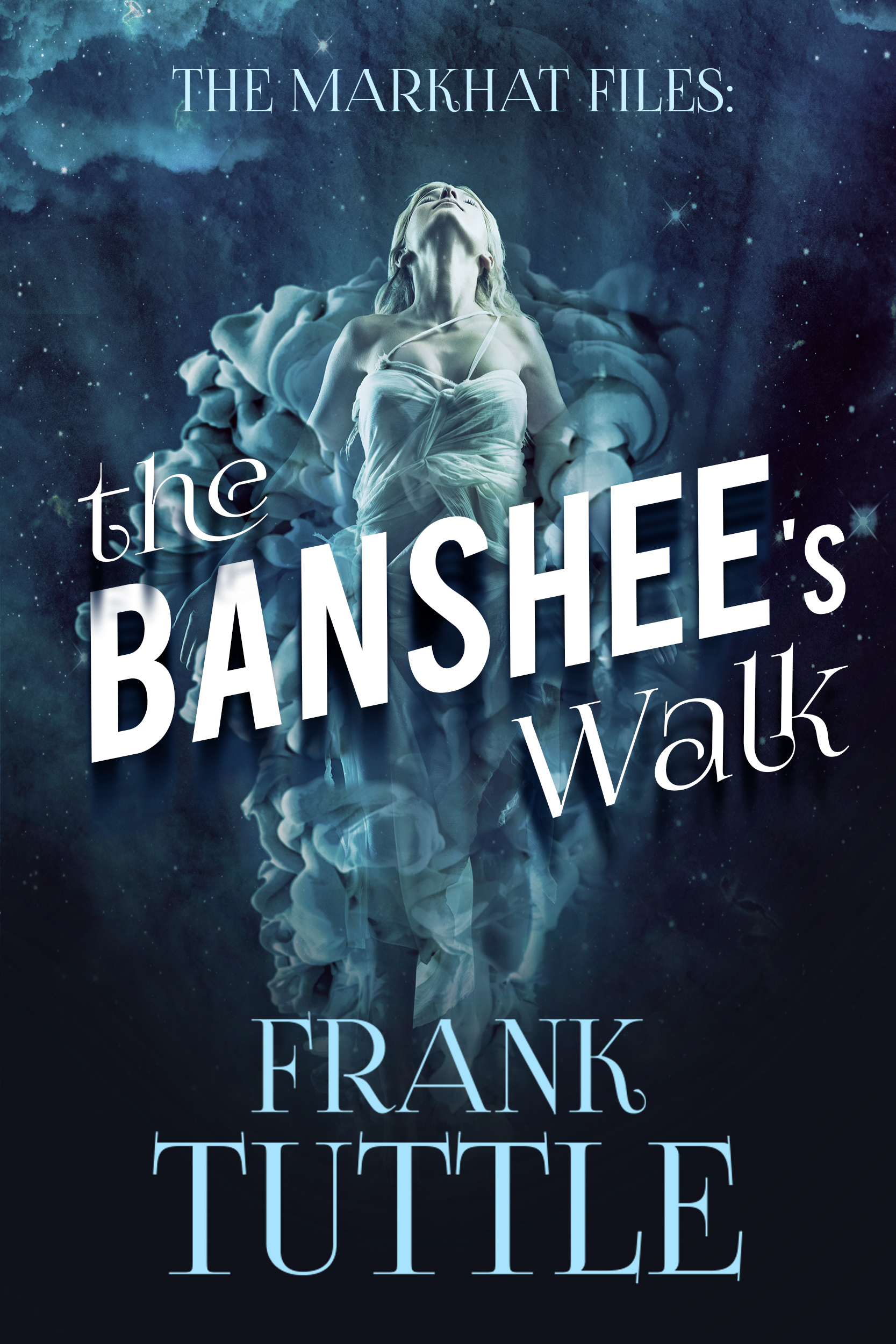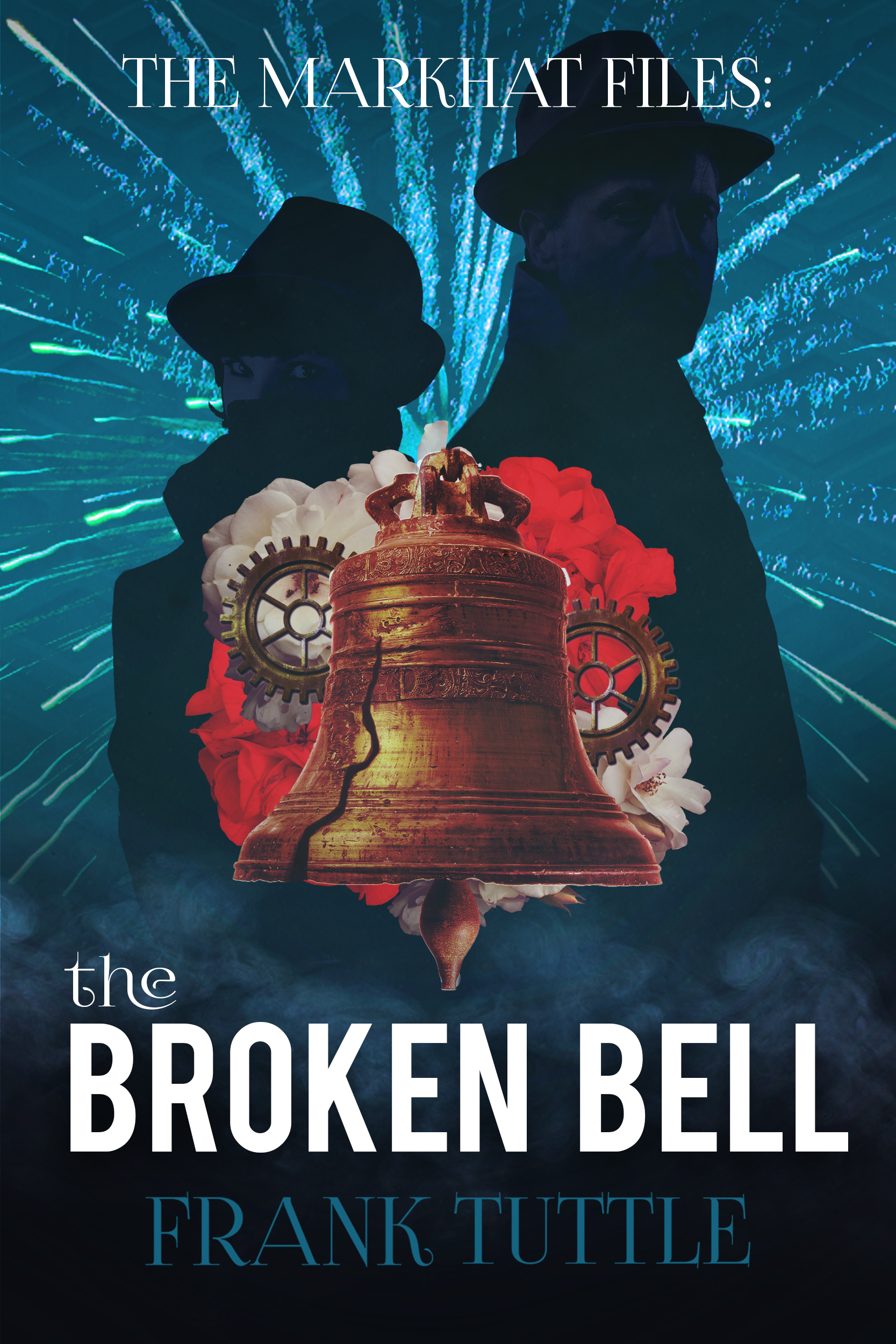As long as the Markhat Files is being relaunched, I thought I'd offer a bit of behind-the-scenes historic stage dressing that shapes and colors the series, but isn't necessarily stated explicitly except in bits and pieces of dialog.
I despise infodumps. Having Markhat and Evis, for example, have a conversation that just happens to run five pages and detail Rannit's history is the worst kind of literary contrivance. I'd sooner put Darla in front of a mirror just so she can describe herself. Both are all-too-obvious moves that induce teeth-grinding and the rolling of eyes by most readers.
Still, cultural context is important. I hope I've sprinkled enough clues here and there to let the reader know the basics, without beating them over the head with my version of the Silmarillion. It's enough to know that Rannit is an ancient walled city which once belonged to the Kingdom, and that the Kingdom went bankrupt and collapsed at the end of the long, bitter Troll war.
By Markhat's time, Rannit is entering the Age of Steam. There are firearms, and foundries. Gas-lamps and horse-drawn taxicabs. Restaurants and shops. Railroads now stretch east and west, into the haunted, sparsely populated wastelands where most of the War was fought. Riverboats ply the sluggish waters of the Brown River, connecting Rannit to the remainder of the surviving Old Kingdom city-states that lie north and south of Rannit.
What follows are some of the notes I work by when writing a Markhat and Darla story. I hope you enjoy them.
THE WAR:
The Kingdom emerged from the chaos and violence of prehistory, in which humanity vied for resources and space with a variety of nonhuman cultures. Foremost among these were the Elder Folk.
The races of the Elders included Elves, the behemoths, the Trolls, and the various other quasi-magical creatures that once walked the vast stretches of forest to the east and the endless, grassy plains of the west. For a thousand years, humans survived as small nomadic bands who relied on stealth to survive. As the population of the Elves grew, humans found themselves pushed closer and closer to outright extinction -- until human shamans discovered sorcery, and for the first time began to wield an effective weapon against their magical foes.
Slowly, and at terrible cost, humanity began to push back. Within a seven-century period dubbed the First Great Expansion, the framework of the Old Kingdom was laid, and the first of the walled cities were erected. The Elvish population was reduced to a mere shadow of its former self, the Trolls retreated to the north and the east, and the last of the towering behemoths was felled in a conflagration that legends claim raged for seventy-two years.
Their realm firmly established, their foes all but vanquished, the victorious humans then embarked on a bloody, pointless civil war between the dozen largest city-states. This period, known as the Interregnum, saw half the Kingdom's new population slain, and three of the great cities razed. When the remaining Elder Folk rose against the survivors, a single king emerged, unified the remaining cities, and established the Kingdom of Man after achieving a precarious victory over the Elvish armies in Kingdom Year 11.
For the next twenty centuries, the Kingdom brawled and quarreled its way across the entire known world. Elves became all but extinct, though a few were rumored to haunt the remnants of wooded, isolated places. The Trolls simply retreated to the icy wastes of the north. The various other odd creatures sought refuge in caves or deserts or beneath lakes and rivers, and for a time, the rule of the Kingdom went unchallenged.
Then, without warning, in the winter of Kingdom Year 1966, a vast army of Trolls swept down from the north. The cities of Vault and Stonewall fell overnight.
By the time news of the Troll invasion reached the heartland, the Trolls, by the tens of thousands, were only a few days behind. City after city fell. Croplands were burned. Bridges and roads were laid waste. The Kingdom's armies, fat and poorly trained after so many years of relative peace, were cut down by the merciless Trolls before they could mount an effective defense.
And still the Trolls marched south. For three years, the Kingdom suffered loss upon top of crippling loss. Universal conscription was implemented, and like so many others, Markhat went off to war.
Just as defeat began to appear inevitable, the newly-minted Corps emerged. Created as a sorcerous component to the regular army, the Corps unleashed a new brand of magic-user onto the battlefield. Employing forces that dwarfed those of the Old Kingdom, Corps sorcerers slowly began to turn the tide of the war.
Markhat was a foot soldier. Specifically, a dog handler, tasked with leading small forces of the Kingdom's best hand-to-hand fighters into tunnels dug by Troll sappers beneath city walls. It was there, down in the dark with his faithful dog Petey at his side, that Markhat learned to face death, but keep crawling.
As the war raged on above, the sorcerers of the Corps grew more reckless, less concerned with casualties among the soldiers they were originally ordered to defend. The magics they used became deadlier, cutting down Trolls and humans in nearly equal numbers. Once greeted as saviors by the army, the arrival of a Corps sorcerer began to be viewed as a death sentence.
Infighting within the Corps quickly revealed the obvious -- that sorcerous prowess of the new magics comes at a price, and that price is the sanity of the practitioner.
Still, the War raged on, until the summer of 1976, when the Trolls, without preamble, simply put down their weapons and ambled away.
The massed Kingdom armies remained frozen in place, awaiting orders which never came. Instead, the powerful sorcerers of the Corps turned on each other, hurling killing spells indiscriminately across the former battlefields. The Kingdom armies dug in, taking hasty refuge from their former protectors.
A month later, the explosions and the strange lights ceased. After that came the news -- the Trolls were planting potatoes and tobacco, the ranks of the wand-wavers were nearly depleted, and at last the war was over.
The Corps was reduced to a few dozen of the most deranged and powerful wand-wavers. In the confusion, rumors began to spread -- rumors that the Kingdom was bankrupt, the King slain by his own bodyguard, the surviving Corps sorcerers part of a secret faction under the command of the Regent of Rannit.
With no clear direction, the Kingdom army simply fell apart. Soldiers commandeered what they could, and walked home, Markhat among them.
He returned to a Rannit that stood alone, governed by a secretive Regent who, if reluctant to show himself, proved a brutally efficient ruler. A new order was installed. The street gangs that had ruled Rannit during the war were annihilated, and the City Watch was instituted. Rannit began to coin its own money. Massive public works projects were begun, including the construction of a reservoir to the south, and the repaving of the city streets. Sewers were dug. The Brown River Bridge was rebuilt, linking east and west Rannit once again.
Markhat soon established himself as a finder. Half the families in Rannit were desperate to locate their sons or fathers or uncles, the ones who didn't return when the war ended, and the kingdom fell. For years, the finder's eye painted on Markhat's door led these families to him, and for a small fee, Markhat would use his experience with the army to seek out their missing relatives.
This business, as time went by, became less about tracking down missing soldiers, and more about poking into private matters the Watch refused to address. But the name stuck, and the finder's eye remains on Markhat's door to this day.
The Regent still runs Rannit. His influence is growing, too, especially after the defeat of Prince (THE BROKEN BELL). Bel Loit, to the south, is a satellite state of Rannit, though this was achieved without bloodshed.
The War is over -- but history suggests that the peace will be fragile, perilous, and above all, brief.
RELIGION:
Religious beliefs within the remnants of the Kingdom are as splintered and as disparate as the remainders of the Kingdom itself. However, most of the belief systems can be traced back to the teachings of the Church, a monolithic religious institution dating back to prehistory.
According to Church teaching, the world was created by a single deity (who cannot be named) in a single day. Jealous of this creation, an equally powerful but evil deity (whose name brings forth calamity if spoken) introduced the Elder Folk into this new world. This caused the creator to bring forth the angels, which he sent into creation to battle the Elders. Enraged, the opposing deity created devils, and set them upon the angels. With mankind getting stomped on hard by both sides, both the creator and the adversary entered the fray, and their struggle nearly broke the world.
Both deities perished, each at the hands of the other. The surviving angels, according to the Church, took up the task of guiding and protecting mankind. The devils, naturally, quickly set about plotting the fall of humanity.
According to the Church, various angels have specific duties. There is Varnoss, protector of the widow and the orphan. Kalin, champion of the soldier. Arnot, defender of the lame and the blind. There are, in some branches of the Church, hierarchies of angels which number in the thousands, with tasks including assisting left-handed poulters or looking after missing thimbles.
Most Rannites ascribe to one of the five Church main holds which hold sway within Rannit's walls. Markhat was raised Orthodox, which means he keeps his birth name a secret, and goes simply by Markhat.
Though raised in a Church family, Markhat is openly contemptuous of Church teachings, seeing priests as nothing but tithe-begging leeches in fancy robes.
ECONOMICS:
Money makes the world go round. These words are inscribed on the pillars of the Brown River Bridge, and they may be the single bit of public inscription with which Markhat agrees.
Old Kingdom money was coined gold. It still spends perfectly well in Rannit, and is often preferred over the Regent's new paper bills. Copper coins, often called 'jerks' as an insult to the kings pressed onto them, are falling out of favor but still have some value among the poor.
Paper bills printed in Rannit have gained acceptance in Prince, Bel Loit, and even out in the frontier, although generally at varying amounts less than face value.
TECHNOLOGY:
Markhat's new association with Evis and the halfdead House Avalante makes him privy to the emergence of new mundane technologies which rely on science and chemistry, rather than sorcery. In a labyrinth of secret laboratories beneath Avalante, science is being pursued. Markhat has seen handguns and rifles emerge, and indeed the average Rannite has come to know cannons, steam engines, and artillery. Markhat knows that the Regency itself is funding these efforts, although to what end, he can only speculate (BROWN RIVER QUEEN).
THE ARTS:
The Regency has been quietly promoting the arts since the end of the war. Playhouses and art galleries have sprung up all over Rannit. While much of the art depicts the war, more and more of it is beginning to explore less violent aspects of Rannite life (THE BANSHEE'S WALK).
BRIDGE CLOWNS:
Every culture has its own odd superstitions. The presence of bridge clowns is a good example of this.
No one knows when the practice began, or where, or why. But within the Old Kingdom, any bridge more than a hundred paces across was expected to be hosted by a bevy of bridge clowns.
As most bridges were maintained by payment of tolls, and as most people refused to cross a bridge not hosted by clowns for fear of bad luck, the practice probably survives as combination of avarice and practicality. The more elaborate and amusing the show put on by the clowns, the higher the toll. Clowning is usually a family trade, often handed down for countless generations. Clowns may look harmless, but blood-feuds between clown families over bridge rights are among the most violent in all of Rannite history.
Clowns also appear on rope-drawn barges, as the barges are considered a bridge of sorts. The new railroads also employ clowns, who must precede the train over bridges in a capering dance.
The clowns who preside over the Brown River Bridge also act as a sort of unofficial police force. Only the most foolish or desperate criminals would dare attempt robbery or assault on the Bridge itself. Those who do find themselves mobbed by clowns and tossed over the side to a cheery wave and honking of various red noses. The Brown River Bridge has also evolved into the de facto neutral meeting ground for the Rannite criminal underworld; all parties concerned know, from brutal experience, that meetings taken on the Bridge will be conducted without violence, or the Clowns will intervene en masse, and with deadly force.
THE CITY WATCH:
Rannit’s police force, newly minted by the Regent, is a civilian agency which on paper answers only to the courts.
In practice, the Watch is riddled with corruption. As Markhat observes, the Watch provides precisely as much protection as any given member of the public can afford to pay. Which is why people turn to him, rather than the Watch.
A crackdown by the Regent is slowly reshaping the Watch into something resembling an actual police force. Progress is slow, though, and Markhat remains skeptical of ever seeing the corruption wither entirely.
Markhat’s adversarial relationship with Captain Holder, although contentious, does provide a glimmer of hope. Holder is hampered by his own floundering bureaucracy but does seem inclined to pursue justice when he can.
That's probably enough for now. I enjoy working in Markhat and Darla's world, warts and all. It's a dangerous place, yes, but it's also a lot of fun to visit.




![[FT-2017-002]-FT-Hold-the-Dark-E-Book-Cover_1400x2100.jpg](https://images.squarespace-cdn.com/content/v1/55d755b8e4b0feb04b611839/1517784069722-KOXKVIFKS1C4EKK5IZ7K/%5BFT-2017-002%5D-FT-Hold-the-Dark-E-Book-Cover_1400x2100.jpg)
![[FT-2017-002]-FT-The-Banshee’s-Walk-E-Book-Cover--200x300.jpg](https://images.squarespace-cdn.com/content/v1/55d755b8e4b0feb04b611839/1517180227596-6R2PKXC3Y05LNDQHQSG9/%5BFT-2017-002%5D-FT-The-Banshee%E2%80%99s-Walk-E-Book-Cover--200x300.jpg)
![[FT-2017-002]-FT-The-Darker-Carnival-E-Book-Cover_200x300 (1).jpg](https://images.squarespace-cdn.com/content/v1/55d755b8e4b0feb04b611839/1517180267967-NF8S06CF8FIJGE3SD730/%5BFT-2017-002%5D-FT-The-Darker-Carnival-E-Book-Cover_200x300+%281%29.jpg)




![[FT-2017-002]-FT-Brown-River-Queen-E-Book-Cover_1667x2500.jpg](https://images.squarespace-cdn.com/content/v1/55d755b8e4b0feb04b611839/1516565296635-S2XR1NYT119EFP633ASH/%5BFT-2017-002%5D-FT-Brown-River-Queen-E-Book-Cover_1667x2500.jpg)















![[FT-2017-002]-FT-The-Broken-Bell-E-Book-Cover-Book-4_500x750.jpg](https://images.squarespace-cdn.com/content/v1/55d755b8e4b0feb04b611839/1505069381545-BHG4A1BNH9IT0PCBU28J/%5BFT-2017-002%5D-FT-The-Broken-Bell-E-Book-Cover-Book-4_500x750.jpg)








